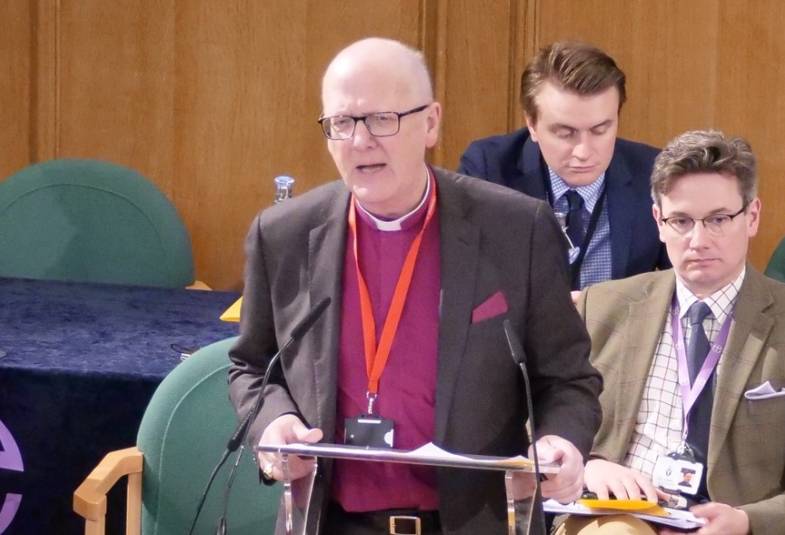
A motion overwhelmingly passed by General Synod, the Church’s Assembly, on Saturday called for a reduction in gambling advertising, and to introduce a levy for gambling firms to help fund research and treatment programmes to combat addicting.
The Bishop of St Albans, Dr Alan Smith (pictured) who has campaigned for gambling reform, introduced the item by telling the Synod that 55,000 children were problem gamblers, and were being ‘groomed’ by gambling adverts.
The story of Jack Ritchie, a young man who killed himself after fighting gambling addiction, elicited many stories from members of Synod of their personal experiences of problem gambling as well as those of loved ones.
Nick Land, of York Diocese, identified himself as having formerly had a problem with gambling, warning that for reformed addicts, “every advertisement is a temptation.”
He described recently having inadvertently arrived at a gambling page, after which every web page he visited was “flooded with advertisements for gambling.”
Supporting the motion, Mr Land said the Church had a “duty of care to help those with weaknesses and vulnerabilities.”
Carrie Myers of Southwark Diocese said that a friend had been able to spend in excess of a million pounds on a single website, calling for systems to prevent such spiralling usage.
Also supporting the motion, Robin Lunn, of Worcester Diocese said that the Church should not be against gambling per se, but should act to prevent gambling which ruined people’s lives.
Zoe Hemming (Lichfield Diocese) added that online betting algorithms were set up to disadvantage users and equated to a “slow walking off a cliff” for those at risk of addiction.
The Bishop of Chelmsford, Stephen Cottrell described gambling sites as a “public space” which should be subject to regulation, and that digital operators must be held to account by Government.
Peter Adams of St Albans Diocese added that the gambling industry “hooked” young users with tailored advertising on streamed services.
Cards were distributed to Synod members, encouraging action by writing to MPs, reporting adverts to regulators and signposting problem gamblers towards the NHS.
Before the motion was unanimously carried, The Bishop of St Albans said: “More children gamble each week than drink, smoke or take drugs. This generational scandal sees young people immersed in social media and tech platforms where the gambling industry relentlessly promote their products as part of a £1.5bn annual spend.
“Football shirts are dominated by betting logos. Clubs must remove these logos and dismantle the wrap-around pitch-side adverts.
“Contrary to what some claim, advertising is influential. The evidence is available and shocking. Gambling advertising is pervasive and is remembered and understood by young people.
“Just last week I met with Charles and Liz Ritchie who also lost their son to gambling addiction.
“As a teenager, Jack Ritchie went into a betting shop and used his dinner money on a bet, thinking it was harmless fun. Within a few years he had taken his own life.
“Gambling addicts are more likely to kill themselves compared with other addicts, and often suffer in silence.
“I believe we can help make society a safer and better world for this generation of children.
“With the victims of this industry and their families in our minds, we can send out a strong signal and commit ourselves to bring about change for the good of all.”
Notes for editors
The General Synod Motion was passed as follows:
That this Synod, noting the greatly increased levels of gambling advertising and research showing significant levels of gambling by children:
- call on Her Majesty’s Government to reduce the quantity and pervasiveness of gambling advertising and introduce a mandatory levy on gambling firms to fund independently commissioned research, education, and treatment programs;
- encourage churches to be an open place for people who have problems with gambling to seek support; and
- ask churches to support initiatives which educate children and young people about risks related to gambling.